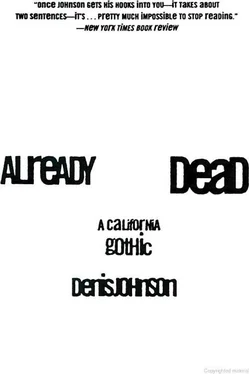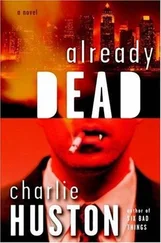I put my head inside the door as any nosy neighbor might. I called:
“Dear?”
No answer.
I willed this. Yes. But I’m not sure that’s why it’s happening. I think I willed it in order to ponder it more deeply. I’m not a doer, I’m a dreamer. Ask anyone! This isn’t me!
Had Van Ness stood here in this room?
Did something of his aura linger by the couch where I’d told him about the plan and read to him from Thus Spake Zarathustra? Nietzsche’s wisdom on sleep was somewhat on the order of this: to sleep well, stay awake. Winona would have done right to have read that!
Already Dead / 129
When I’d showed Van Ness the Zielene and Nembutal, I’d read to him from Nietzsche on sleep—“Avoid all those,” Nietzsche’s Wise Man warns convulsively, “avoid all those who sleep badly and are awake at night.”
“I might apply that to you,” I’d pointed out to him.
“And vice versa,” he’d said.
Yes, yes, yes, I agreed with him tonight, half-aloud, running my finger along the spines of books…Oh yes. We should have avoided each other.
We’d talked about things other than sleep — he’d quoted at some length from Zarathustra —but what we’d read I couldn’t quite — fumbling among the shelves beside the couch for the book, which wasn’t there, scattering books to the floor in a spasm of irritation — couldn’t quite recall.
Where was my book of Nietzsche? Winona never would have touched it.
Had Van Ness come here, and found my wife comatose, and put the pillow over her face? And held it there for a long time, until she was dead, and then gone on to violate something — please be sensitive to this, it’s not absurd, please feel this corrupt truth — and then descended the stairs to violate something delicate and precious by stealing my Nietzsche?
I called out: “Winona?”
I looked around the living room. Nothing seemed disturbed. In the kitchen half a cup of coffee on the table and a scattering of mail, junk mail, and off by itself an envelope with a folded card jutting from it, a Hallmark card presenting the portrait of a little girl cuddling a dog.
Inside on the left-hand page a printed cursive read “Just Thinking of You” and on the facing page in my own father’s weak hand: Since you don’t have the care or interest it would take to pay me a visit, here’s a letter for you. I mean to cut your name from my will and testament. Everything goes to my boys but they can’t hack up the redwoods. Meeting my lawyers next week. You might as well clear out of that house, it’s Junior’s. And don’t come sniffling around here at this late date. Once I say a thing it’s solid.
I’d hardly begun to make sense of this communication before another one caught my eye — a postcard, the same kind Van Ness had 130 / Denis Johnson
mailed me—“Greetings from Santa Cruz,” where the ferris wheel meets the ocean and seems ready to glide into that gigantic blueness.
I turned the card over. The message read Now we’ll see . No postmark.
He’d carried this card here in his pocket, and laid it down with his hand.
The spasm that wrenched me knowing that he’d actually entered this house set loose a spray of images inside me, bits and pieces blown above the forest, the forest of dreams — I’d walked in a dream through these rooms, but their walls had given onto other places, a ramshackle barn full of strangers who claimed I should know them, and I lied, saying that I did, and in that place this very tabletop had upheld a pile of fruit.
It was impossibly strong, nauseating, violently so, the sense that I was both remembering and experiencing this, that I could, if I just stood still and collected myself, predict the next thing to happen in this kitchen.
According to the plan, the point of my being here was to discover the body. But I hadn’t considered that I’d actually have to discover the body . This was no theory. I was living it.
“Winona?”
The silence sank me. Told me that Van Ness had lived it too. And Winona had felt his hands on her throat — or, no, the pillow against her face — or dreamed a cloud had come down and drowned her. What had Winona dreamed? What had Van Ness felt? What is it like? Who are we really?
Had she known it was someone, a person, doing this to her? It seemed only right that even in a dream, even in total blackness, even in drugged dreams, we’d know the truth if we were dying.
A man walks into the house where his wife may lie murdered. And realizes that he’s twisted his life so badly that only this, the worst thing he’s ever done, could twist it back the other way.
“Winona!” I scream, and it echoes beyond the window, puny and garbled, down the arroyos and out to sea. I can’t bring it back. The name just disintegrates over the waters and that’s that. It’s impossible to bring it back!
Through this feeling of helplessness suddenly burst a piercing nostal-gia for the lost world of childhood. The way it came right up against the heart, that world, and against the face. No indoors or outdoors, only everything touching us, and the grown-ups lumbering past overhead like constellations. I can feel the big silence upstairs Already Dead / 131
getting bigger. There’s nobody there and I’m not going up to see. Because I can’t move. I’m small and my hands and feet are too large. Tonight’s music was the moans of Gyuto monks and their smashed cymbals and rattling broken instruments and the unearthly squalling of their horns. Madness at first, adrenaline nightmare, nothing to grip, zooming madness, voices, a hundred thousand feelings, grief and regret chief among them. I’ve plunged into the water and I’m sinking, sinking.
Memories roll over me. Italy — Rome, above all, Rome — pigeons lit up in the sunlight — and I saw the buildings in their dirty greatness but I kept thinking Keats, Keats died around here someplace…In Italy I felt closest to Winona, particularly in the churches, where I felt the farthest from heaven. In the cathedral in Milan I looked upward through twenty leagues of failure to the beautiful dome above. A bomb going off couldn’t have hurt that silence. Everywhere dripped the blood of stained-glass martyrs, too many of them, we’ll never get them sorted out. When we toured the duomo’s basement, a region that seemed to pre-date even its stones, something in the ripe, must-filled cloisters seemed to have gone out — not a light, but a time. And something about those skinny moldering rooms of deteriorating jewelry made the whole cathedral somewhere above our heads seem a lie, the pomp dissembling over the darker miracle worked in the streets, in the spermy churches of apartment flats, where lovers in their beds were getting high, or spilling toward the Sea of Love with eyes grown soft and blind in loused-up situations. Miracle! — your incense followed the blond American woman to Sicily, to the town of Monreale in the altitudes, and I, her husband, followed you. And felt myself erased by the cathedral…fading beside the flowers…This church in Monreale was smaller and more to the point. On the walls and ceilings, from the making of our wild, tearful earth to the martyrdom of Saint Paul, they’ve laid out Christian history in a billion tiny tiles…You have to drop money in a slot to get the lights to go on — as grand as all this is, it operates on the principle of the honky-tonk jukebox. The electric lights brighten and darken according to the random coins the faithful feed the meter box, and in the dome Christ’s concave face, the world’s second-largest mosaic portrait, lights up overhead, looks down awhile, blacks out again. It doesn’t matter that the church’s curators are niggardly. Nobody goes there who isn’t crushed by its beauty. In those vast religious places, as here, now, in life’s deepest abyss, we feel a plunging 132 / Denis Johnson
Читать дальше












